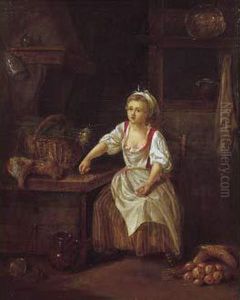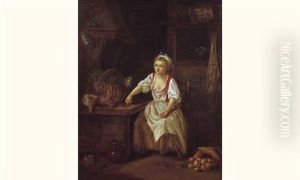Charles Francis Greville Paintings
Charles Francis Greville was an eminent British antiquarian, collector, and patron of the arts, though not an artist himself. Born on May 12, 1749, in Warwickshire, England, Greville was a notable figure in the late 18th century, particularly known for his role in the cultural and political life of his time. He was a younger son of Francis Greville, 1st Earl of Warwick, and his wife Elizabeth Hamilton, daughter of Lord Archibald Hamilton. Greville was educated at Westminster School and went on to study at Trinity College, Cambridge.
Greville's place in art history is not due to his own artistic contributions but rather his significant impact as a patron and his associations with key figures in the art world. He is often remembered for his relationship with the famous British painter Sir Joshua Reynolds and his patronage of George Romney, another prominent painter of the day. Additionally, Greville is recognized for his involvement with the famous gem engraver and cameo artist, Giovanni Pichler, whose work he collected avidly.
Aside from his artistic connections, Charles Francis Greville is perhaps most famously known for his association with Emma Hamilton, the future mistress of Admiral Horatio Nelson, one of Britain's greatest naval heroes. Emma, who was known as Emma Hart during her time with Greville, was initially his mistress and model. Greville played a significant role in her early life, introducing her to the artist George Romney, who would create many famous portraits of her. Greville eventually passed Emma onto his uncle, Sir William Hamilton, a British envoy to Naples, whom she married before becoming involved with Nelson.
Apart from his personal relationships, Greville was also a noted mineralogist and plant collector. He was responsible for commissioning the Warwick Vase, an ancient Roman marble vase that he had restored. In the realm of mineralogy, Greville’s name is attached to the mineral Grevilleite, named in his honor due to his contributions to the field.
Charles Francis Greville passed away on April 23, 1809. He left behind a legacy as a significant cultural figure of his time, known for his keen interest in the arts, his collection of antiquities and natural objects, and his influence on the lives and careers of several prominent figures in the art and social circles of Georgian Britain.

